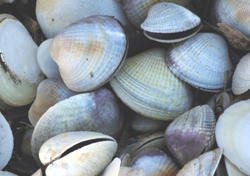Cockles
There are three tasks focusing on cockles: one looking at observations; one reading food chains; and one looking at relationships in a marine ecosystem.
Cockles live in sheltered coastal areas around New Zealand.

They are a very important food source in some marine ecosystems.

Cockles are an important link in the food web of organisms that live in the coastal waters of New Zealand. Imagine what would happen to the organisms of this food web if people took large numbers of cockles for themselves.
Questions 3 & 4 assesses your understanding of the interdependence of organisms in a food web.

